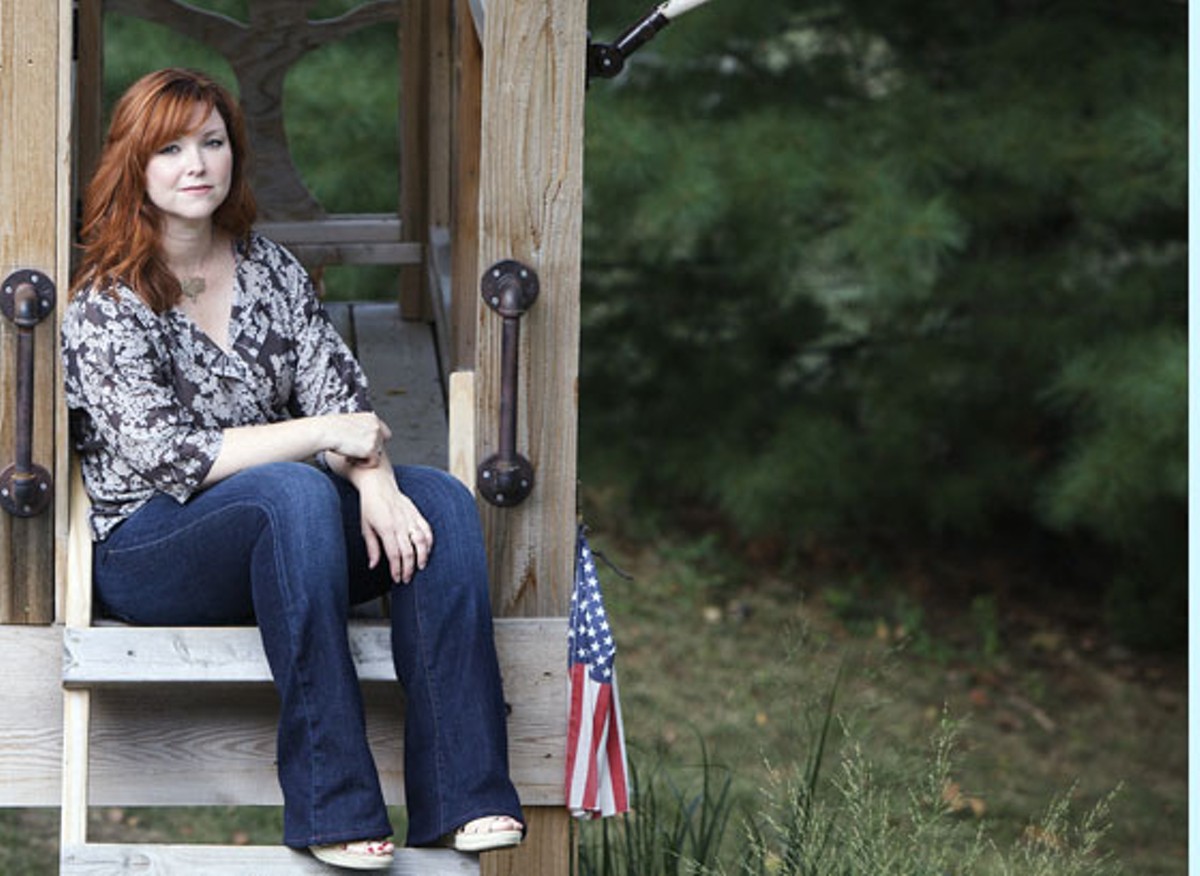Earlier this summer, to celebrate her 40th birthday, Angela Mitchell traveled to Ireland with her family. "It got me thinking about how a landscape affects the people who live in a place," she says. "The west of Ireland is very rocky. It's amazingly difficult to deal with the rocks. It's similar to where I grew up [in the Missouri Ozarks]. Every spring we'd have to pick rocks out of the garden. The land would shift, and the rocks kept coming up. I started thinking about that, and how the people in my family settled that place. They were the kind of people who were drawn to that kind of challenge."
Mitchell grew up on the same farm near Mountain Grove, where her mother's family has lived for eight generations, since the 1830s. She first heard the old family stories from her grandmother. "Early in the morning, at 6 a.m., I'd go to the milk barn and talk with her while she was milking the cows," Mitchell remembers. "She had a great sense of humor and a great sense of tragedy. There was a great lightness and darkness in our family, and she knew when to reveal those things in a story, to make them funny and tragic."
On the surface Mitchell's life appears very different from that of her grandmother. She lives on a quiet suburban street in Ballwin and is working toward her MFA in creative writing at the University of Missouri–St. Louis. There are no barns, no cows. There is, however, a coffee bar in the Schnucks at the corner of Route 141 and Clayton Road in Town & Country where Mitchell composes her own stories on her laptop.
"They have squishy seats here," she explains. "That's very important, because a big part of writing is staying in your seat."
At home there are a million distractions: piles of laundry that need to be folded, swaths of pet hair that need to be Swiffered and various living creatures that need to be fed and attended to: one husband (Robert Phillips, a lawyer), two sons (Duncan, age ten, and Aidan, eight), one dog, two cats and eight parakeets. (Originally there were just two, but they kept reproducing. Now Mitchell confiscates the eggs.)
At first glance Mitchell's short stories appear mundane. They're populated by people who work boring jobs in insurance offices and used-car lots and worry about their weight and their relationships and how to train their dogs. But there's strange stuff going on just beneath the surface that gives the reader a prickling feeling that things aren't exactly right. Like her grandmother, Mitchell has an unerring sense of when to deploy odd details for maximum effect. Like that guy in the office? The one you're thinking of sleeping with? The one who has taken you to his house in the middle of nowhere? He keeps a bobcat for a pet.
(The bobcat is actually borrowed from an Ozark neighbor. "He went up a tree and got it," Mitchell marvels. "When I saw it, it was in a pen with a golden retriever. They were being punished together for killing a turkey. I thought, 'I am so fortunate to be from southern Missouri. I go to see my folks, and I see a bobcat.'")
Her characters aren't always likable. They're not hateful, either, but, as Stephanie G'Schwind, the editor of the Colorado Review, which published Mitchell's bobcat story, "Animal Lovers," puts it: "Dee [the main character] is the sort of person who hopes her dogs get hit by a car. But what I really love is that by the end of the story, you feel a real vulnerability and start to feel a little scared for her. It's an amazing thing Angela is able to create."
Mitchell started writing nine years ago. As a high school and college student, she had the desire but lacked the nerve. She read constantly and cultivated writerly habits such as carrying a notebook in her purse where she could jot down ideas, but she feared the criticism she knew was inevitable. Paradoxically, she also didn't want to hide all her manuscripts in the dresser, Emily Dickinson-style.
"Never believe it when someone tells you" — here Mitchell assumes a virtuous whine — "'I only write for myself.' Writing is not one-sided. It lacks satisfaction and meaning without an audience."
Then she gave birth, which put things into perspective. ("After the humiliation and struggle of childbirth, everything looks better.") She got into the habit of writing every day during her sons' naptime. After a few years of experimentation and fumbling, she produced a story. She sent it off to the Missouri Review. It was rejected, but it came back with an encouraging letter.
She joined the St. Louis Writers Workshop and then, in the fall of 2007, enrolled in the creative-writing MFA program at UMSL so she could learn more quickly and meet other writers. "If you're a stay-at-home mom," Mitchell explains, "nobody's going to engage you in a conversation about character development."
At first grad school confirmed all her worst fears about writing. "Her first stories didn't come together," remembers John Dalton, now the director of UMSL's MFA program, who just published his own second novel, The Inverted Forest. "I let her know in the workshop. It's never easy to take. But good students have a resilient ability to roll up their sleeves and say, 'Wait till you see what I do next!'"
("I hated the guy," Mitchell recalls. "I hated his criticism. Then I realized he was right.")
Mitchell was a good student. Now Dalton describes her stories as "funny, unnerving and gracefully composed. And entertaining. That's not the same as 'light' or 'frivolous.' Readers want to be entertained. 'Entertaining' is a very high compliment, by my way of thinking."
Mitchell's list of publications is short — three stories in small literary magazines — but she has won the Colorado Review's Nelligan Prize and was a finalist for Poets & Writers' prestigious Maureen Egen Writers Exchange Award. More experienced writer friends had warned her that there wasn't much of a market for short stories and that to get a wider audience, she'd have to write a novel.
Still, she was surprised a year ago when she began writing a story about her grandfather's childhood that grew too complex to be confined to a short-story format. "By the second chapter," she says, "I thought, OK, it'll be a novella. But then there was a third and fourth chapter, and I became committed to the idea that it was a novel."
The novel, called Travelers, concerns a group of characters who have lost everything in the Great Arkansas Flood of 1927 and have become so desperate that they've resorted to constructing what Mitchell calls "redneck diving helmets" out of spare gaskets, spigots and hoses. They use them to walk along the river bottoms and search for salable trash and for mollusks that might yield freshwater pearls they could sell to a button factory in Iowa.
"Right from the beginning, it was gripping, original, lively, funny and scary," Dalton raves. "It's a little bit Southern, a little bit larger than life. It's going to find a future audience."
Mitchell heard about the pearl seekers at a symposium at Arkansas State University, from a woman who was writing her doctoral dissertation on the pearl-button industry. "I don't know if my grandfather ever looked for mollusks," she says, "but it's a daring thing he could have done.
"It shows that stories come from strange places," she continues. "Some is fiction. Some is based on a lot of reality. There are kernels of family stories. And now, after I've written a fictional scene, I can't tell the difference. It's made me an unintentional liar."
Angela Mitchell's prize-winning short story, "Animal Lovers," is accessible on the website of the Colorado Review, via this link (shortened for your key-stroking pleasure): http://bit.ly/pVGQz7
Click here to return to our list of MasterMind Award winners.






